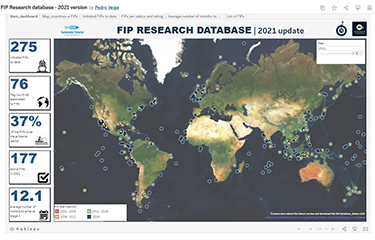SFP, Hilborn Lab release updated FIP database

The Sustainable Fisheries Partnership (SFP) and the University of Washington’s Hilborn Lab have released a new version of the Fishery Improvement Projects Database (FIP-DB), which includes 275 publicly recorded FIPs.
The database was created through a partnership between the Hilborn Lab and SFP. The FIP-DB is a comprehensive database of FIPs reaching back to 2003, when FIPs were first established.
“In the last two decades, FIPs have spread around the globe, from the first FIPs in industrial European whitefish fisheries in 2003 to more than 70 countries and 150 species, in both the industrial and artisanal sectors,” SFP Senior Scientist Pedro Veiga said. “Our FIP database is an important central resource for historical FIP-related data.”
The database upgrade includes several years of FIP progress ratings and FishSource scores for fisheries that are or have been associated with the FIPs. It also included an updated tableau dashboard with key insights and FIP-related indicators, as well as allowing users to download a simplified version of the entire database.
"The database is an invaluable asset for researchers wanting to understand the organizational landscape in which FIPs operate. It has formed the base for systematic analysis of the actions undertaken within FIPs to promote fisheries sustainability and the actors involved in each action – in different parts of the world, and across different fisheries. As such, it is a key resource for supporting analyses that can help identify opportunities and challenges that FIPs face," said Beatrice Crona, the executive director of the Global Economic Dynamics and the Biosphere Program at the Royal Academy of Sweden.
The historical data provided by the database can lead to better management decisions and overall better FIP design and implementation, Crona said.
Hilborn Lab Research Scientist Nicole Baker Loke said improving FIPs is the core driver behind the partnership between SFP and Hilborn Lab.
“Standardized and consistent analysis of FIP performance and characteristics is critical for establishing and improving FIPs,” Baker Loke said. “As the demand for sustainable seafood continues to grow, it is vital to understand what policy approaches work successfully in a FIP, which countries and fisheries have made the most advances in terms of management performance, and what are the underlying factors that contribute to operational improvements in a fishery.”
The database draws from and complements existing sources, including FisheryProgress.org. The updated database and research will be presented at the International Institute of Fisheries Economics and Trade conference in Vigo, Spain, in July.
Image courtesy of Sustainable Fisheries Partnership






Share